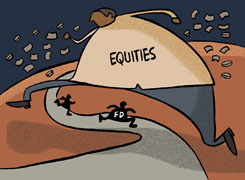Instead of banks which give poor interest and also taxed annually, which are better short, medium and long term options for prudent investing?
Ans: Prudent Investment Options for Short, Medium, and Long Term
Many individuals rely on bank savings accounts or fixed deposits (FDs) for parking their money, largely due to the perceived safety and ease of access. However, the low interest rates offered by these products, combined with the annual taxation of returns, often make them suboptimal for wealth generation. Given the need to generate better returns while still managing risk, we explore several alternatives that can help you achieve your short, medium, and long-term financial goals more effectively.
Let’s break down the various investment options into different categories: short-term, medium-term, and long-term, while considering safety, returns, and liquidity.
Short-Term Investment Options (1-3 Years)
Short-term investments are typically for those who need access to their funds within one to three years. The goal here is to preserve capital with minimal risk, while earning returns higher than a bank savings account or a fixed deposit.
Debt Mutual Funds Debt mutual funds invest primarily in fixed-income securities like government bonds, treasury bills, corporate bonds, and other money market instruments. For short-term investments, funds that focus on low-duration securities are preferable, as they offer a balance between risk and return.
Why Debt Mutual Funds? Unlike bank FDs, debt mutual funds offer better post-tax returns, especially for those in higher tax brackets. After three years, debt funds enjoy indexation benefits, which can significantly reduce the tax on long-term capital gains. This makes them more tax-efficient than bank deposits.
Liquidity and Safety Debt funds also provide liquidity. You can access your funds within a few days, making them a better alternative for short-term financial goals. The risk in these funds is relatively low when you choose funds with high-quality instruments and short durations. It’s important to consult with a Certified Financial Planner to select the right debt mutual funds based on your risk profile.
Liquid Funds Liquid funds are a subset of debt mutual funds that invest in very short-term securities, typically maturing in less than 91 days. These funds are ideal for short-term investments where you might need access to the money quickly.
Why Liquid Funds? Liquid funds provide better returns than bank savings accounts, often without much risk. They are perfect for those who want to park money temporarily or have a buffer for emergencies. Many liquid funds offer almost instant withdrawal options, making them highly accessible.
Great for Emergency Savings If you’re setting aside money for an emergency fund, liquid funds are a great place to park this money. They are less risky than equity mutual funds and offer returns that can beat inflation in the short term.
Ultra-Short Duration Funds These funds invest in fixed-income instruments with a slightly longer maturity, typically less than one year. They offer a better yield than liquid funds, while still keeping the risk relatively low.
Why Ultra-Short Duration Funds? Ultra-short duration funds are ideal for investors who want a little more return than liquid funds but are still risk-averse. These funds are suitable for short-term goals such as saving for a vacation, a down payment, or any expense expected within a couple of years.
Short-Term Goals with Low Risk Ultra-short duration funds offer a good compromise between returns and safety for short-term investors. They are generally more stable than long-term bond funds, making them an attractive option for cautious investors.
Medium-Term Investment Options (3-5 Years)
When looking at investments with a time horizon of three to five years, a balance between growth and safety becomes important. You can afford to take on a little more risk to get better returns, but preservation of capital remains a priority.
Balanced Advantage Funds Balanced Advantage Funds are hybrid funds that dynamically shift between equity and debt, depending on market conditions. They aim to deliver steady returns with moderate risk.
Why Balanced Advantage Funds? These funds are designed to handle market volatility. They shift towards equities during a bullish market and move towards debt during bearish markets. This strategy ensures better returns than pure debt funds, without the full risk of equity funds.
Suitable for Conservative Investors If you are a moderately conservative investor looking for stable growth with some equity exposure, balanced advantage funds can be a good option. They offer better tax treatment as well, as they are treated like equity funds for tax purposes, reducing the long-term capital gains tax liability.
Conservative Hybrid Funds These funds invest around 75-90% in debt instruments and the remaining in equity. This combination makes them safer than pure equity funds while offering slightly better returns than debt-only funds.
Why Conservative Hybrid Funds? Conservative hybrid funds aim to provide income through debt, with some capital appreciation from equity exposure. They are less risky than aggressive hybrid funds but offer better returns than traditional debt products like FDs.
Ideal for Medium-Term Investors If your investment horizon is 3-5 years, and you want a safer approach to growing your wealth, conservative hybrid funds could be a smart choice. They balance growth with safety, making them suitable for those nearing retirement or with medium-term financial goals.
Arbitrage Funds Arbitrage funds take advantage of the price differences between the cash and futures markets. They generate returns by buying in the cash market and selling in the futures market.
Why Arbitrage Funds? Arbitrage funds offer the advantage of low risk and good tax efficiency. Since they are treated as equity for tax purposes, investors benefit from lower capital gains tax. Moreover, these funds are less volatile than equity funds and offer relatively stable returns.
Safe in Volatile Markets If you’re looking for a low-risk product in volatile markets, arbitrage funds can be a safe bet. They provide equity-like tax benefits without exposing your capital to the full risk of equity markets.
Long-Term Investment Options (Above 5 Years)
When investing for the long term, the focus should be on growth, as inflation can significantly erode purchasing power over time. Equity-based investments are ideal for long-term goals, as they tend to outperform other asset classes over extended periods.
Equity Mutual Funds Equity mutual funds invest primarily in the stock market and are designed for long-term growth. They are ideal for investors who are looking to generate wealth over a 5-10 year horizon or longer.
Why Equity Mutual Funds? Equity mutual funds offer the potential for high returns, especially over the long term. Over periods of 5-10 years, equity funds tend to outperform debt funds, FDs, and other fixed-income products. This makes them ideal for long-term goals like retirement or funding your child's education.
Types of Equity Mutual Funds There are various categories within equity funds, such as large-cap, mid-cap, and small-cap funds. Large-cap funds are relatively safer, while mid-cap and small-cap funds offer higher growth potential but come with more volatility. It’s important to diversify across these categories based on your risk tolerance.
Active vs. Index Funds Many investors are tempted by index funds due to their low expense ratios. However, actively managed funds can provide superior returns by outperforming the benchmark index, especially in emerging markets like India. A skilled fund manager can make decisions based on market conditions, unlike index funds, which merely follow the market. Actively managed funds are often a better choice for investors seeking higher growth and market-beating returns.
Tax-Saving Mutual Funds (ELSS) Equity Linked Savings Schemes (ELSS) are mutual funds that invest primarily in equities and offer tax benefits under Section 80C of the Income Tax Act.
Why ELSS? ELSS is one of the best tax-saving investment options available in India. It has a lock-in period of just three years, which is much shorter compared to other tax-saving instruments like PPF (Public Provident Fund) or NSC (National Savings Certificates). Moreover, since ELSS is an equity-oriented fund, it offers the potential for higher returns.
Ideal for Long-Term Growth While the lock-in is only three years, ELSS should be treated as a long-term investment. The longer you remain invested, the better the returns you can expect. For tax-saving purposes, investing in ELSS can help you reduce your taxable income while also generating long-term wealth.
Multi-Asset Funds Multi-asset funds invest in a mix of asset classes, including equity, debt, and gold. This diversification within a single fund helps reduce risk while still allowing for growth.
Why Multi-Asset Funds? These funds are designed to provide diversification, which reduces the overall risk of your investment. If one asset class underperforms, others may compensate for it, thus balancing the portfolio. Multi-asset funds are ideal for investors who want to diversify but don’t have the time to manage multiple investments.
Best for Long-Term Investors Multi-asset funds are suitable for long-term investors who prefer a balanced approach. These funds can help you meet long-term financial goals while offering a more stable return profile than pure equity funds.
Public Provident Fund (PPF) The Public Provident Fund is a government-backed savings scheme with a 15-year lock-in period. It offers assured returns and tax benefits under Section 80C.
Why PPF? PPF is one of the safest long-term investment options available. It offers guaranteed returns, and the interest earned is tax-free. Additionally, the entire amount invested in PPF is eligible for tax deduction under Section 80C, making it a tax-efficient investment.
Safe and Stable PPF is ideal for conservative investors who prioritize safety and tax benefits over high returns. While the returns may be lower than equity mutual funds, they are assured and backed by the government, making PPF a low-risk investment.
Sovereign Gold Bonds (SGBs) Sovereign Gold Bonds are government securities issued by the Reserve Bank of India that allow you to invest in gold without holding physical gold.
Why SGBs? SGBs offer the benefits of gold as an investment, along with an additional interest component of 2.5% per annum. They are safer than holding physical gold, as there are no concerns about storage or security. SGBs also offer tax benefits if held till maturity.
Great for Diversification Gold is often considered a hedge against inflation and economic instability. Investing in SGBs can help diversify your portfolio and reduce overall risk. They are ideal for long-term investors looking to protect their wealth against inflation and currency fluctuations.
Key Factors to Consider
Regardless of your investment horizon, it's crucial to consider the following factors when making decisions:
Risk Tolerance: Your comfort level with taking risks will influence the types of investments that suit you. Equity investments are high risk but can provide high returns, whereas debt investments are lower risk but provide more modest returns.
Tax Implications: Always consider the tax treatment of the investment. Products like debt mutual funds and SGBs can offer tax advantages compared to FDs and other fixed-income products.
Liquidity Needs: Some investments lock your money in for a fixed term, while others offer greater liquidity. Ensure your portfolio has enough liquid assets to cover emergencies.
Financial Goals: Align your investments with your financial goals. If you’re saving for retirement, long-term growth is crucial. For short-term goals, preservation of capital becomes a priority.
Finally
Prudent investing is about balancing growth, risk, and tax efficiency. Moving beyond traditional bank deposits can help grow your wealth faster and protect it from inflation. Whether you're planning for short-term needs or long-term goals, it's essential to choose investments that align with your risk appetite and financial objectives.
Consulting a Certified Financial Planner ensures that your investment strategy is well-structured, tax-efficient, and monitored over time. They can help you make informed decisions and guide you towards achieving your financial goals smoothly.
Best Regards,
K. Ramalingam, MBA, CFP,
Chief Financial Planner,
www.holisticinvestment.in


























